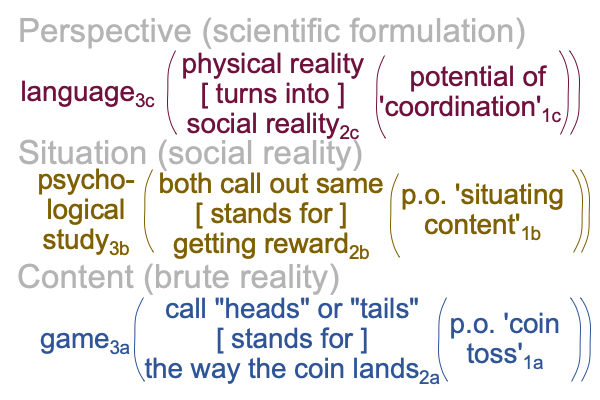0890 Chapter two further develops the concept of coordination.
In the 1960s, economist Thomas Schelling (1921-2016 AD) devises games to test coordination. Often, a game is framed as physical reality. Then, the game reveals social reality.
0892 Consider this variation of the game of coin toss. A tester flips the coin and two parties call out “heads” or “tails”. Then, the coin comes up, “heads” or “tails” and an award is given when both parties call out the same prediction. If both call “heads” or if both call “tails”, a reward is given to each contestant.
This is the kind of game that academics construct.
0893 This game is so strange that the perspective-level normal context of language3c is crucial, since the reward should go to the person who calls the coin toss correctly. Instead, it goes to both parties when they call the same.
Here is a picture of the way that Schelling designs this game (as reported by Enfield).

0894 Note how the explicit abstraction of ‘coordination1c‘ changes with this experiment.
‘Coordination1c‘ for standard coin tosses goes like this, “We agree that the one who correctly calls the coin landing with heads or tails up is the winner and gets the reward.”
The ‘coordination1c‘ for this variant of the game says, “Some nutty professor has changed the rules so that if both parties call the same ‘heads’ or ‘tails’, then both parties get a reward.”
0895 The strangely academic allure of this research is that contestants play a game where the rules are set by an egg-head so scrambled that he wins the Nobel Prize in economics for his work on game theory, rather than by themselves. In effect, the professor inserts himself as the one who decides the rules, rather than the participants recalling the tradition of the game. The participants are agreeable. After all, they get rewards. But, they cannot imagine one implication.
Experts rule the potential of coordination1c, by manipulating explicit abstractions of speech-alone talk3c in order to alchemically manifest the way that physical reality [turns into] social reality2c.
0896 How freaky is that?
0897 Well, never mind.
Enfield notes that Schelling’s trials show that physical realities are like trails that lead to social landmarks that are easily recognizable.
Physical trails [lead to] social landmarks!
That’s what the trials show.
That does not sound freaky at all.
